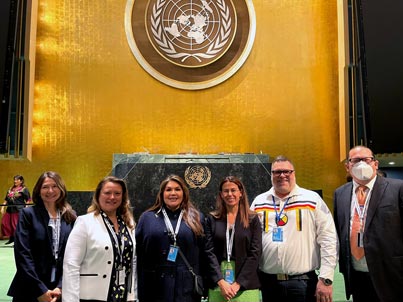Supporting Tribal Leaders on FPIC, Language Rights, Repatriation, and Accountability for Human Rights Violations During Boarding School Era
May 2, 2022 By Kevin Miller
The 21st Session of the United Nations Permanent Forum on Indigenous Issues is underway at the United Nations in New York, NY. The theme of the Session is “Indigenous Peoples, business, autonomy and the human rights principles of due diligence including free, prior and informed consent.” Tribal leaders are present in full force, both to hold the United States accountable for its human rights responsibilities and to show solidarity with other Indigenous Peoples around the world.
The Session opened on Monday, April 25, 2022, with a Thanksgiving Address in the Mohawk language by Katsenhaienton Lazare. President of the General Assembly Abdulla Shahid (Maldives) and President of the Economic and Social Council Collen Vixen Kelapile (Botswana), then acknowledged Indigenous Peoples’ rights as a priority for the United Nations and the entire world community.

Pictured (L to R): NARF Staff Attorney Sue Noe, NCAI President Fawn Sharp (Vice President of the Quinault Indian Nation), Cherokee Nation Delegate Kim Teehee (Director of Government Relations for the Cherokee Nation), Prof. Kristen Carpenter (University of Colorado), UN Permanent Forum on the Rights of Indigenous Peoples Member Geoffrey Roth and Shawnee Tribe Chief Ben Barnes
Several agenda items followed, in which Indigenous representatives from all over the world made statements for the Permanent Forum to consider in its report to the Economic and Social Council. These statements will inform recommendations to national governments, including the United States, and to the UN General Assembly.
National Congress of American Indians (NCAI) President Fawn Sharp noted in an intervention that the United States must implement the UN Declaration on the Rights of Indigenous Peoples, which recognizes Indigenous Peoples’ rights to self-determination, land, and culture, among other rights.
President Sharp emphasized that American Indian and Alaska Native rights can be safeguarded, in part, when governments enter into mutual agreements regarding natural resource development, climate change, and other matters impacting them, as required by the Declaration’s provisions on free, prior, and informed consent.
In a session on language rights, Cherokee Nation Principal Chief Chuck Hoskin, Jr., emphasized the importance of the UN’s International Decade of Indigenous Languages. Hoskin said, “As we launch the International Decade of Indigenous Languages … working with other language warriors reminds us that this undertaking is truly a global effort.” Chief Hoskin called on stakeholders to “set real goals for the end of this ten year span to create and inspire more speakers.”
Other Indigenous leaders called on national governments to take note of the relationship between linguistic wellbeing and health as one of the reasons why the United States and other countries should realize Indigenous Peoples’ language rights and participate in the International Decade of Indigenous Languages.
Permanent Forum member Aleksei Tsykarev inquired about the status of the Yaqui peoples’ request for Sweden to repatriate their sacred Maaso Kova, a ceremonial deer head, held by the Swedish National Museums of World Culture. The Swedish parties agreed in principle to the repatriation in 2020, following a dialogue with Yaqui leaders facilitated by the United Nations Expert Mechanism on the Rights of Indigenous Peoples (EMRIP). The EMRIP said it will invite Sweden to provide an formal update on efforts to fulfill the agreement.
Chief Ben Barnes of the Shawnee Tribe drew attention to “the pernicious intergenerational harm of reeducation camps, boarding schools, [and] of certain missionary efforts” including the Shawnee Indian Manual Labor School. He called specifically for the assignment of a Special Rapporteur to “monitor, document, and provide a report … on the status of remedy and consultation between member states and indigenous peoples,” and for states to engage in “substantive consultation that comports with FPIC principles … so we may achieve full remedy, reconciliation and truth-telling.”
Several meetings were held in the margins of the Forum. At a meeting hosted by NCAI, members of the Mexican and Canadian missions met with tribal leaders. The United States mission was invited but did not attend. Mohawk representative Kenneth Deer and UN Permanent Forum on Indigenous Issues Member Geoffrey Roth held a meeting of Indigenous Peoples from both the United States and Canada.
The Implementation Project was represented at the United Nations by its Co-Directors Sue Noe, Senior Staff Attorney at the Native American Rights Fund, and Kristen Carpenter, Professor at the University of Colorado, along with Kevin Miller, American Indian Law Program Fellow at the University of Colorado. The team will hold virtual webinars in conjunction with the Forum on May 3 and May 5, 2022, and all are welcome to register and attend.
The Implementation Project is a joint initiative of the Native American Rights Fund and the University of Colorado Law School to advance education and advocacy regarding the United Nations Declaration on the Rights of Indigenous Peoples.
